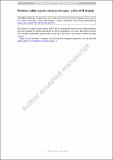Premium cabin capacity sharing strategies: airline RM insights
Author(s)
Escovar-Álvarez, Germán; Belobaba, Peter P.
Download41272_2021_326_ReferencePDF.pdf (1.001Mb)
Publisher Policy
Publisher Policy
Article is made available in accordance with the publisher's policy and may be subject to US copyright law. Please refer to the publisher's site for terms of use.
Terms of use
Metadata
Show full item recordAbstract
Abstract
This paper explores revenue management strategies for premium cabin capacity sharing, that is, accepting additional bookings in economy fare classes when some premium cabin seats are expected to remain empty. Two heuristics are presented and tested to evaluate the impacts of premium cabin capacity sharing on airline revenues and loads. These RM strategies are tested using the Passenger Origin Destination Simulation (PODS), which replicates the interactions between airline revenue management systems and passenger choice of airline itineraries, fare types and service offerings. Based on the simulations, the methodologies proposed can generate total revenue gains of up to 1.1%. However, two caveats are identified: first, losses in the revenue captured from premium fare classes are likely to be experienced due to displacement by economy fare class passengers. Second, premium cabin capacity sharing should only be implemented in the final stages of the booking process; otherwise, the sharing heuristics can result in revenue losses for the airline.
Date issued
2021-06-11Department
Massachusetts Institute of Technology. Department of Aeronautics and AstronauticsPublisher
Palgrave Macmillan UK
Citation
Escovar-Álvarez, Germán and Belobaba, Peter P. 2021. "Premium cabin capacity sharing strategies: airline RM insights."
Version: Author's final manuscript